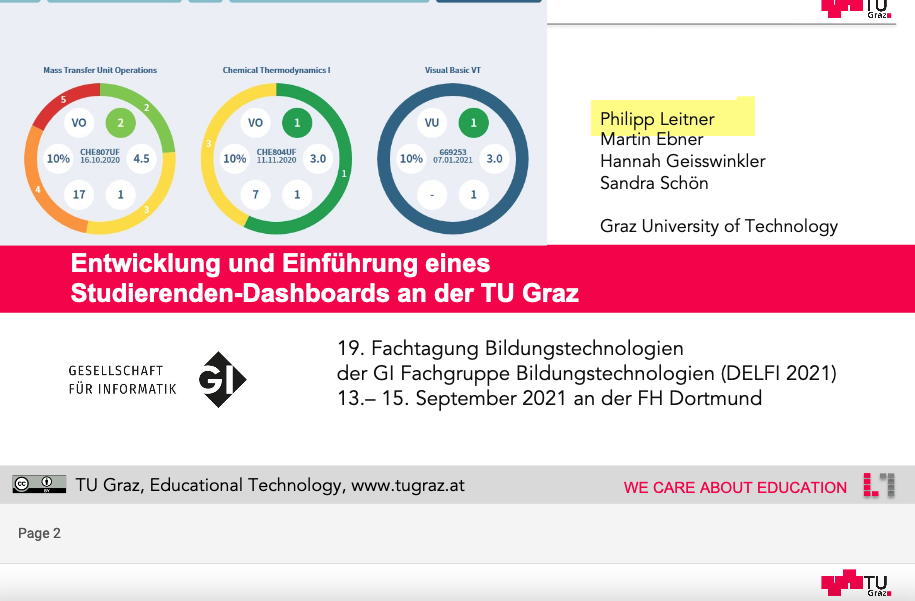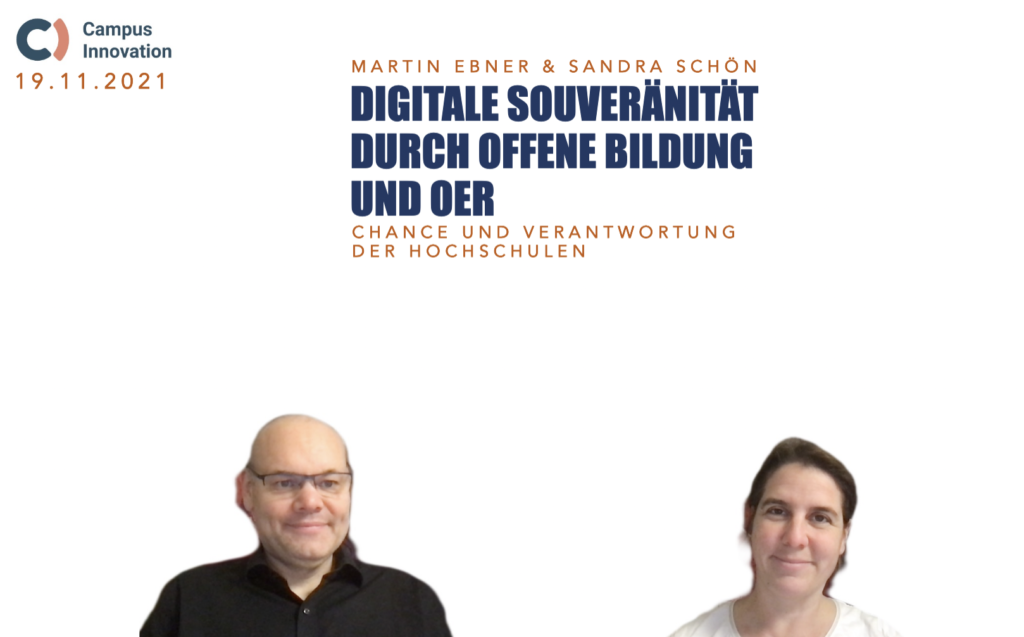Quelle: Sandra Schön Autor: sansch
Im Rahmen der DELFI 2021 haben wir über unsere Entwicklungen rund um eine Studierenden-Dashboard an der TU Graz berichtet. Hier findet man den Foliensatz:

Quelle: Sandra Schön Autor: sansch
Im Rahmen der DELFI 2021 haben wir über unsere Entwicklungen rund um eine Studierenden-Dashboard an der TU Graz berichtet. Hier findet man den Foliensatz:

Quelle: Sandra Schön Autor: sansch
Another contribution to last year’s ED-Media 2021 conference about „The relation of prior IT usage, IT skills and field of study: A multiple correspondence analysis of first-year students at a University of Technology“ got published. The slides are already here online.
Abstract:
Starting from the question of whether the students in the different fields of study differ in terms of several variables related to IT and learning with IT, namely their general extent of IT usage, the extent of IT usage for learning, the IT skills of the students, their participation in online courses, if they learned coding basics at school and the extent of IT usage in class at school, a multiple correspondence analysis (MCA) was chosen to find answers. The MCA resulted in four clusters of fields of study. The inclusion of the variables in the biplot shows that for one dimension the IT skills of the students are crucial, and for the second dimension a further variable, the type of school added as supplementary points, explains the differences between subjects. Finally, the article discusses that these insights might change drastically – especially due to the changed conditions of first-year students with regard to their experiences with the use of IT in learning as a result of the school closures during COVID-19 pandemic. The data for this analysis come from the survey of first-year students at Graz University of Technology (TU Graz) in 2020 (N=955) which is subjected to a secondary analysis in this article.
Refrence: Mair, B., Ebner, M., Nagler, W., Edelsbrunner, S. & Schön, S. (2021). The relation of prior IT usage, IT skills and field of study: A multiple correspondence analysis of first-year students at a University of Technology. In T. Bastiaens (Ed.), Proceedings of EdMedia + Innovate Learning (pp. 304-312). United States: Association for the Advancement of Computing in Education (AACE). Retrieved August 15, 2021 from https://www.learntechlib.org/primary/p/219673/.
Quelle: Sandra Schön Autor: sansch
Our contribution to last year’s ED-Media 2021 conference about „Change of IT equipment and communication applications used by first-semester students from 2011 to 2020 and possible effects of the COVID-19 pandemic: Analysis of a long-term“ got published. The slides are already here online.
Abstract:
The technical equipment of first-year students and their preferred communication applications are changing. This paper presents the two latest, unpublished surveys of first-year students at Graz University of Technology (TU Graz) from 2019 (N=824) and 2020 (N=955) and compares the results concerning devices and applications with the results of the surveys conducted since 2011. The analysis shows that laptops, desktop computers and smartphones are among the most important and widespread multifunctional devices, while the MP3 player in particular or the social media application Facebook have lost most of their former importance. The increasing importance of photo-based social media applications, first and foremost Instagram, is striking. If comparing the data from 2019 to those from 2020, the first academic year start that took place within the COVID-19 pandemic, the same applies to the use of Facebook and Facebook Messenger, which now only have the same minor significance as Telegram, Signal, Skype, or others. Concerning effects of the COVID-19 pandemic on the equipment and communication tools used, the authors see a major impact on the prevalence of portable powerpacks.
Reference: Nagler, W., Mair, B., Ebner, M., Edelsbrunner, S. & Schön, S. (2021). Change of IT equipment and communication applications used by first-semester students from 2011 to 2020 and possible effects of the COVID-19 pandemic: Analysis of a long-term survey. In T. Bastiaens (Ed.), Proceedings of EdMedia + Innovate Learning (pp. 107-114). United States: Association for the Advancement of Computing in Education (AACE). Retrieved August 15, 2021 from https://www.learntechlib.org/primary/p/219645/.
Quelle: Sandra Schön Autor: sansch
We are happy that our contribution about „Evaluation Design for Learning with Mixed Reality in Mining Education Based on a Literature Review“ got published now.
Abstract:
Mixed Reality technologies are on the rise in the educational sector. However, research shows that there is still a lack in knowledge concerning the evaluation of these technologies. In this paper we present a research on current practices in evaluation for Mixed Reality. For this purpose, we selected 94 publications from between 2015 and 2021 and reduced them to 45 which included formal evaluation processes. We then adapted a classification scheme by Duenser et al. [5] and categorized these papers according to their evaluation methods. We present our overall findings and explain some examples more detailed. The results are then compared to previous work outside and within the MiReBooks project and applied on the didactical framework. This allows us to illustrate the development of this sector over the last years and it helps us to enhance our own evaluation approaches. First results also show that there is a rise in evaluation approaches recently and that the overall goals for these processes did not change much from 2008.
Reference: Thurner S., Daling L., Ebner M., Ebner M., Schön S. (2021) Evaluation Design for Learning with Mixed Reality in Mining Education Based on a Literature Review. In: Zaphiris P., Ioannou A. (eds) Learning and Collaboration Technologies: Games and Virtual Environments for Learning. HCII 2021. Lecture Notes in Computer Science, vol 12785. Springer, Cham. https://doi.org/10.1007/978-3-030-77943-6_21
Quelle: Sandra Schön Autor: sansch
At Graz University of Technology (TU Graz, Austria), the learning management system based on Moodle (https://moodle.org/ – last accessed February 10, 2021) is called TeachCenter. Together with a campus management system – called TUGRAZonline – it is the main infrastructure for digital teaching and general study issues. As central instances for both teachers and students, various services and support for them are offered. The latest developments include the design and implementation of a study progress dashboard for students. This dashboard is intended to provide students a helpful overview of their activities: It shows their academic performance in ECTS compared to the average of their peers, their own study progress, and the official study recommendation as well as the progress in the various compulsory and optional courses. The first dashboard prototype was introduced to all computer science students in May 2020, and a university-wide rollout started in December 2020. The chapter describes design considerations and design development work, implementation, as well as the user feedback on the implementation. Finally, the authors present recommendations as guidelines for similar projects based on their experience and students’ feedback and give an outlook for future development and research.
[article @ book’s homepage] [draft @ ResearchGate]Reference: Leitner P., Ebner M., Geisswinkler H., Schön S. (2021) Visualization of Learning for Students: A Dashboard for Study Progress – Development, Design Details, Implementation, and User Feedback. In: Sahin M., Ifenthaler D. (eds) Visualizations and Dashboards for Learning Analytics. Advances in Analytics for Learning and Teaching. Springer, Cham. https://doi.org/10.1007/978-3-030-81222-5_19
Quelle: Sandra Schön Autor: sansch
Im Rahmen des Open Education Austria Projektes ist die TU Graz zusammen mit der FNMA verantwortlich ein Konzept für eine Zertifizierung zu entwicklen. Den Stand hierzu haben wir auf der OER-Konferenz 2021 einem internationalen Publikum präsentiert.
Zusammenfassung: Das Forum Neue Medien in der Lehre Austria (fnma) ist im Rahmen des Projekts «Open Education Austria Advanced» für die Entwicklung und Einführung eines Verfahrens zum Nachweis und Sichtbarmachung von Aktivitäten in Bezug auf offene Bildungsressourcen (Open Educational Resources; kurz OER) verantwortlich. Im Beitrag wird zu OER aus Perspektive österreichischer Hochschulen zu den Hintergründen und Kriterien für die OER-Zertifizierung, bisherigen Entwicklungsarbeiten sowie der Konzeption berichtet.
[Beitrag @ ResearchGate] [Tagungsband]Referenz: Schön, Sandra; Ebner, Martin; Brandhofer, Gerhard; Berger, Elfriede; Gröblinger, Ortrun; Jadin, Tanja; Kopp, Michael & Steinbacher, Hans-Peter (2021). OER-Zertifikate für Lehrende und Hochschulen. Kompetenzen und Aktivitäten sichtbar machen. In: Cinzia Gabellini, Sabrina Gallner, Franziska Imboden, Maaike Kuurstra und Peter Tremp (Hrsg.) Lehrentwicklung by Openness – Open Educational Resources im Hochschulkontext, Luzern: Pädagogische Hochschule Luzern, S. 29-32, https://doi.org/10.5281/zenodo.5004445
Quelle: Sandra Schön Autor: sansch
The Turkish Ministry of Educations invites to the „DISTANCE EDUCATION CONFERENCE on LIFELONG LEARNING“ and I will contribute with a presentation about Open Educational Resources. Slides are availabe online, if somebody is interested in!
Schön, Sandra (2021). Open Educational Resources: A global movement on the rise. Presentation at the Distance Education Conference on Lifelong learning (Istanbul), 13. December 2021. Slides: https://www.researchgate.net/publication/356980411_Open_Educational_Resources_A_global_movement_on_the_rise
Quelle: Sandra Schön Autor: sansch
Wir wurden gefragt, ob wir für die Campus Innovation Konferenz 2021 eine Keynote halten wollen, rund um Digitale Souveränität und die Rolle von OER. Als besondere Herausforderung wünschte man sich, dass Martin und ich dies gemeinsam machen sollen. Wir haben es probiert und hoffen auch, dass es gut gelungen ist – hier gibt es nachträglich noch die Vortragsfolien:

Referenz: Martin Ebner und Sandra Schön (2021). Digitale Souveränität durch offene Bildung und OER. Chance und Verantwortung der Hochschulen.Keynote auf der Campus Innovation 2021, 19.11.2021 [.pdf]
Quelle: Sandra Schön Autor: sansch
Maker Education hatte es in den letzten 18 Monaten nicht leicht, und ist doch soo wichtig. Darüber spreche ich heute beim Maker Festival:
Welche Kompetenzen sollten zukünftige Weltgestalter/innen haben? – Ausgehend von dieser Frage skizziert Sandra Schön Potentiale der Maker Education, Beispiele und Ergebnisse aus der Forschung von Maker-Initiativen aus dem deutschsprachigen Raum.
Quelle: Sandra Schön Autor: sansch
 Heute bin ich ein erklOERbOER: In meinem Vortrag bei der ViTeach gehtdarum:
Heute bin ich ein erklOERbOER: In meinem Vortrag bei der ViTeach gehtdarum:
Offene Bildungsressourcen sind Lehr- und Lernmaterialien, die explizit offen lizenziert sind (siehe UNESCO-Erklärung, 2019). Zu den bekanntesten offenen Lizenzen gehören die drei Lizenzierungsoptionen Creative Commons CC BY, CC BY-SA und CC0. Der Vortrag nennt Hintergründe und Beispiele für OER-Videos und ihre vielfältigen Verwendungsmöglichkeiten und Anpassungen sowie Tipps für die Entwicklung von OER-Videos.
Zu den Folien bitte hier entlang: